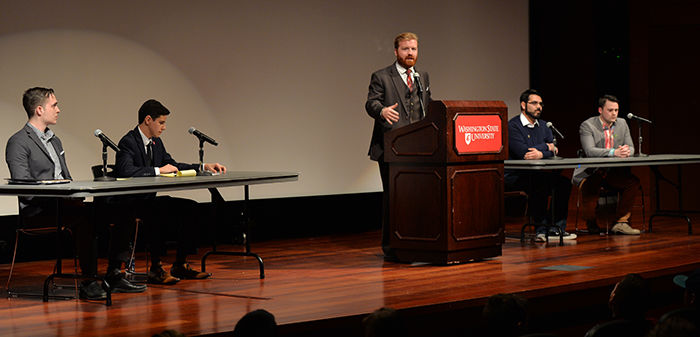Young Democrats/College Republicans debate an example of political parroting
ASWSU Sen. Kevin Schilling moderated a debate between the Young Democrats and the College Republicans in the CUB Auditorium on Wednesday.
March 28, 2017
I propose doing away with experts, since everyone now seems to be one on foreign policy, healthcare, economics, constitutional law and history. Last week’s debate between the Young Democrats and College Republicans implies at least four politically engaged individuals on this campus believe so.
Middle East
“Last I checked the Middle East has been fighting for 1,000 years,” said James Allsup, president of the College Republicans.
This is an exaggeration. Even if only hyperbole, one could say the same of Europe, perhaps even more so. Moreover, the countless years of peace under the Ottoman Empire cannot be discounted.
“How about more foreign language translators and trying to fix the borders in the Middle East?” said Gavin Pielow, president of the Young Democrats.
Foreign policy is much more complex than language learning and good intentions. The artificial borders of the Middle East drawn in the 1920s cannot be merely ‘fixed.’ Moreover, many if not a majority of the foreign language experts stationed in the Middle East are attached to the military. Their training comes not through diplomacy dollars but well-spent defense budgets.
Healthcare
“Moving away from the insurance model and moving toward a cash-for-care model would really benefit us as Americans. We would have better access to doctors, there would be more medical innovation,” Allsup said.
Like all predictions, these are tenuous hypotheses at best. One might argue the cash-for-care model has been tried and motivated the creation of the insurance industry in the first place. One might also argue the cash-for-care model already exists for some people to catastrophic effect.
“We would be much better off with free and open competition across state lines,” said Mario Vega, member of the College Republicans, concerning insurance plans.
Vega falls into the ongoing conceit that healthcare markets operate like any other market. Indeed, Vega and others mistakenly believe Economics 101 lessons of perfect competition can be applied uniformly to all markets.
Healthcare suffers from several major market failures, the biggest being information asymmetry. First, a person does not know when he or she will become ill. Second, when he or she goes to the doctor this is not a negotiation between equals. A doctor has expert information the patient does not have and therefore will provide care regardless of the expense and the patient will accept it.
Insurance provides not only an access to emergency liquidity for care but also a price negotiator for treatments and prescriptions. The rationale behind government-based insurance or healthcare is a single negotiator of healthcare and pharmaceutical prices.
“The United States is perhaps one of the only modernized nation without the single payer system,” said Josh Maasberg, a member of the Young Democrats and a columnist at The Daily Evergreen.
This requires major correction. The United States is one of the only industrialized nations without a universal healthcare scheme; however, universal healthcare is provided by a variety of schemes.
According to Business Insider, France has the best healthcare in the world.
“The French system combines private and public sectors to provide universal health coverage to all. Most citizens receive their insurance through their employer and almost everyone has supplemental private insurance,” according to Business Insider.
This is not single payer.
Executive power
“Obama’s been expanding executive power … taking it away from the judiciary,” Maasberg said.
Executive orders have recently been used to overcome legislative gridlock, not judicial review. Moreover, the American Presidency Project reports Obama signed 276 executive orders; five-year President Calvin Coolidge signed 1,203.
Most importantly, ASWSU continues to make the mistake of parroting the Young Democrats and the College Republicans as the only ones who can have a political debate. Assuredly there are those who are equally engaged and informed, if not more so, around campus who could have a more robust debate on policy issues than on broad brushstrokes that do not deviate much from the feeling and flavor of the campaign.
Tyler Laferriere is a graduate student pursuing his master’s in economics from Phoenix, Arizona. He can be contacted at 335-2290 or by [email protected]. The opinions expressed in this column are not necessarily those of the staff of The Daily Evergreen or those of The Office of Student Media.








